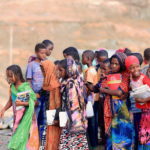Our project studies the role of the public sector and the opportunities it can provide for women’s employment and the gender pay gap in low-income countries (LICs). Using the preliminary evidence from microdata for a number of SSA countries, we show that the public sector in poor economies behaves very differently from private firms: it…
Women’s Employment and Family Decisions in Sub-Saharan Africa
Leveraging Community-Based Childcare to Address Gender Gaps in Labour Market and Educational Outcomes Across Multiple Generations in Ethiopia
The project, to be conducted jointly by the Centre for Global Development (CGD) and Policy Studies Institute (PSI), aims to answer the following questions by evaluating a randomized trial of community-based childcare and early learning facilities as part of Ethiopia’s flagship Productive Safety Net Programme (PSNP): What is the impact of providing affordable childcare to…
Long-Run Impacts of Factory Jobs: Labour Market Outcomes, Wellbeing, and Fertility in Ethiopia
In recent years, Ethiopia has become a hub for textile and garment manufacturing. These factories provide employment opportunities in low-skilled jobs, drawing many young women into the formal labour force. Although the factories create formal jobs in a labour market characterized by a lack of wage employment opportunities, an important question remains whether low-skilled factory…
Can Temporary Financial Incentives for Female Industrial Workers Lead to Long-Term Retention and a Better Allocation of Talent?
In this project, the research team studied whether worker turnover contributes to the misallocation of talent in low-income countries. To address this question, the team experimentally evaluated the impacts of offering financial incentives for worker retention in a female-dominated occupation within the nascent garment manufacturing industry in Ethiopia. The central hypothesis was that many young…
Urban Density and Labour Markets
Many of the world‘s poorest people live and work in dense informal settlements in Africa’s growing megacities. These communities have both positives and negatives. On one side, settlements, often located in central areas, provide workers with access to geographically proximate jobs, dense informational and social networks, and a large demand base for entrepreneurial ventures. Density…
Assisting Job Search in Low-Employment Communities
Jobs are hard to find in Africa. Searching for jobs in African labour markets is expensive and time consuming. Job seekers, the young unemployed in particular, find it hard to be selected for the available positions. As a result, new employment opportunities are often not shared equally. Many economies in sub-Saharan Africa have achieved high…
Labour Markets and Household Enterprises
It is a general tenet of economic theory that competitive markets, supported by adequate infrastructure and institutions, do a better job of determining prices and allocating resources than do large-scale government planning programmes. In the structural adjustment era of the 1980s-90s, this belief underpinned a historic shift away from central planning and toward market liberalisation…
Fairtrade, Labour Markets and Women’s Economic Empowerment in Ethiopia
Fairtrade has spread under the promise that it has the power to lift poor smallholder farmers out of poverty by providing them with technical assistance, credit, and better prices for their crops. Fairtrade is also viewed as a niche market for high value products in a context of globalisation and trade liberalisation policies that affect…
Social Insurance and Labour Market Outcomes in Ethiopia
This project aimed at evaluating the labour market implications of a major social insurance reform program in Ethiopia introduced in June 2011. Employment based and mandatory pension schemes for workers in the formal private sector of Ethiopia were introduced by this reform. Given the high urban unemployment rate in Ethiopia, which at the time of…
Are Labor Costs in Africa too High?
High labor costs appear to be a factor that undermines the creation of low-skill jobs in formal manufacturing firms at a large scale in several African countries. First, there exists a small number of formal manufacturing firms in Africa. These firms face higher labor costs than similar firms in numerous comparator countries, even after controlling…









